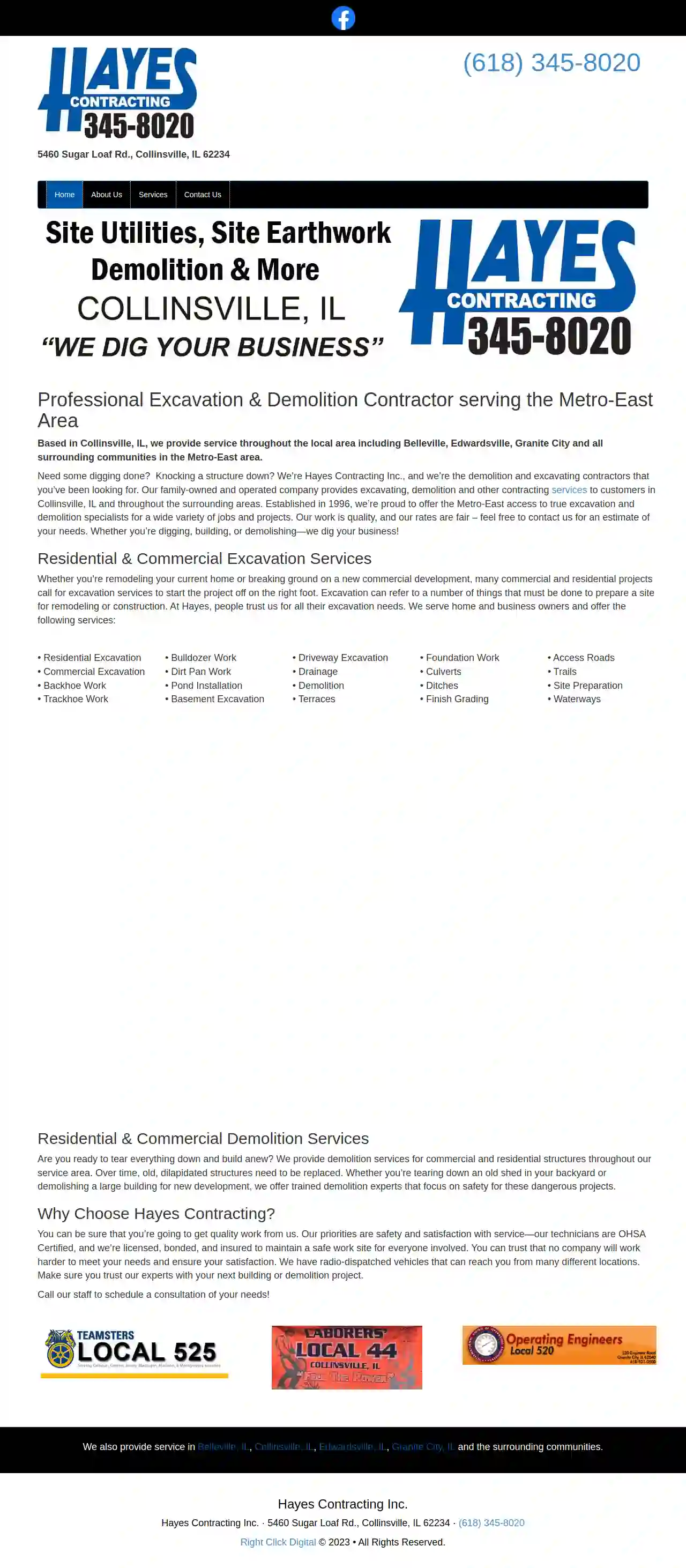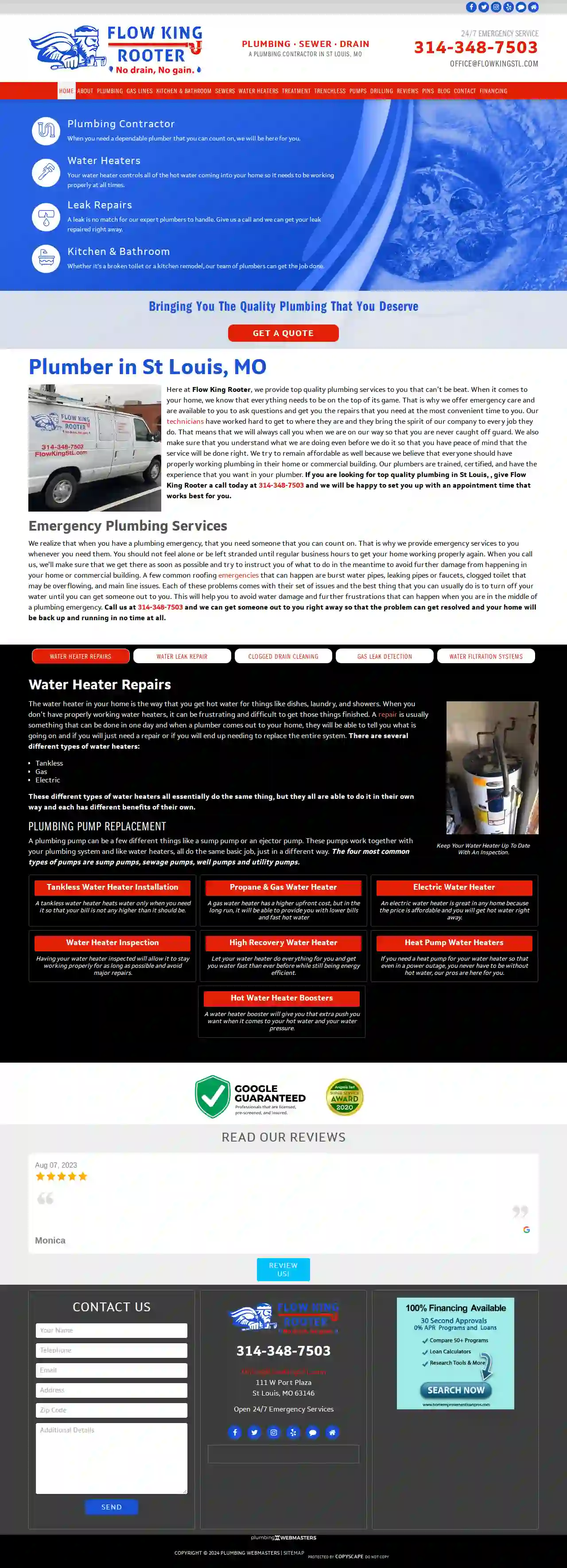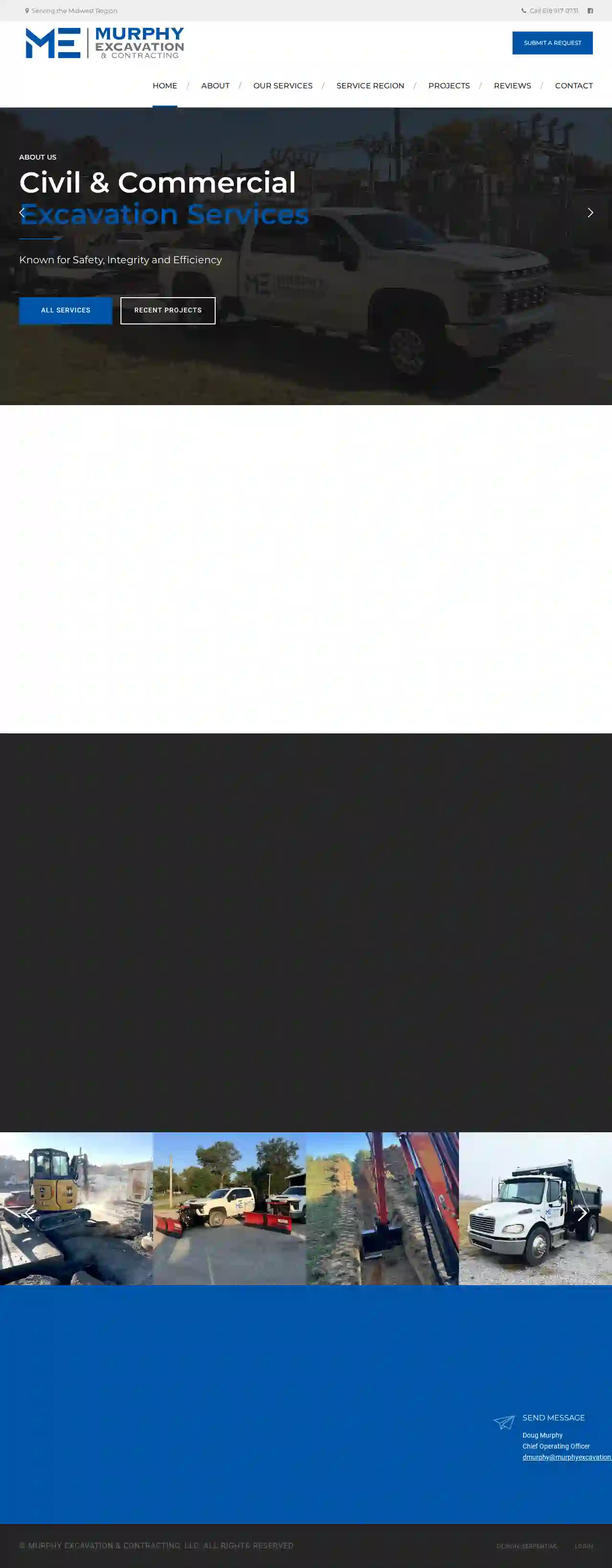Demolition Contractors Weldon Spring
Best Demo Contractors in Weldon Spring
Receive up to 3 Local Demolition Contractors quotes for your project today! Compare profiles, reviews, accreditations, portfolio, etc... and choose the best service.

Hayes Contracting Inc
53 reviews5460 Sugar Loaf Rd., Collinsville, 62234, USProfessional Excavation & Demolition Contractor serving the Metro-East Area Based in Collinsville, IL, we provide service throughout the local area including Belleville, Edwardsville, Granite City and all surrounding communities in the Metro-East area. Need some digging done? Knocking a structure down? We’re Hayes Contracting Inc., and we’re the demolition and excavating contractors that you’ve been looking for. Our family-owned and operated company provides excavating, demolition and other contracting services to customers in Collinsville, IL and throughout the surrounding areas. Established in 1996, we’re proud to offer the Metro-East access to true excavation and demolition specialists for a wide variety of jobs and projects. Our work is quality, and our rates are fair – feel free to contact us for an estimate of your needs. Whether you’re digging, building, or demolishing—we dig your business!
- Services
- Why Us?
- Gallery
Get Quote
Flow King Rooter
4.786 reviews111 W Port Plaza, 111 W Port Plaza St Louis, MO, St. Louis, 63146, USWhen you need a dependable plumber that you can count on, we will be here for you. Here at Flow King Rooter, we provide top quality plumbing services to you that can’t be beat. When it comes to your home, we know that everything needs to be on the top of its game. That is why we offer emergency care and are available to you to ask questions and get you the repairs that you need at the most convenient time to you. Our technicians have worked hard to get to where they are and they bring the spirit of our company to every job they do. That means that we will always call you when we are on our way so that you are never caught off guard. We also make sure that you understand what we are doing even before we do it so that you have peace of mind that the service will be done right. We try to remain affordable as well because we believe that everyone should have properly working plumbing in their home or commercial building. Our plumbers are trained, certified, and have the experience that you want in your plumber. If you are looking for top quality plumbing in St Louis, , give Flow King Rooter a call today at 314-348-7503 and we will be happy to set you up with an appointment time that works best for you.
- Services
- Why Us?
- Gallery
Get Quote
Excavating St. Louis
51 reviewsBarnhart, USResidential & Commercial Excavation Services throughout St. Louis City, County & Jefferson County No job is too large or too small, we are here to help. Our team of skilled professionals is here to provide you with all your excavation needs. We specialize in residential and commercial projects, including sewer line repairs, land clearing, site preparation, and grading. At Excavating St. Louis, we are committed to delivering exceptional services that exceed your expectations. Contact us today to learn more about how we can help you with your next project. Call (636) 288-6627 for your free estimate today. Trusted Experience Whether you’re planning a new build or in need of a sewer line repair anywhere in St. Louis and Jefferson County, we have you covered. With over 20 years in the industry, we are able to plan and execute a variety of excavating projects that include land clearing, digging, grading, demolition and sewer line repairs. Professional Service We are experienced, fully insured professionals ready to provide prompt and reliable services. We know how to prioritize and multi-task to ensure your project is completed with quality workmanship. Count on us to provide efficient, safe, and high-quality sitework services.
- Services
- Why Us?
- Gallery
Get Quote
Kamadulski Excavating & Grdng
4.314 reviews4336 HWY 162, Granite City, 62040, USHistory of KAMEX Kamadulski Excavating & Grading Co, Inc. was founded in 1958 by Leo and Fannie Kamadulski. The Kamadulski family owned and operated the company until Leo and Fannie’s son, David Kamadulski, sold the company in 2019. The mission of the Kamadulski family was to deliver quality service to their customers at a fair price. Ryan Fischer and Mark Crays joined the company in 2013. Ryan and Mark purchased stock in the company in 2015 and completed the purchase in 2019. In 2021, the current ownership group rebranded the company as KAMEX. KAMEX has become an industry leader in the St. Louis Metro East. The company continues to expand into new sectors, including Commercial Warehouse Infrastructure, Environmental Landfill Cell Construction, Federal USACE Projects, Heavy Highway, Large Scale Transmission Water & Sewer Mains, Industrial, Mechanical, and Residential Subdivisions. Our Story Strong values of hard work and lasting relationships continue to define our culture. We work together as a team, supporting and encouraging each other. We have created an environment that values success in terms of relationships and results. Our mission is to offer our customers a quality experience and our staff an outstanding place to work and build their own legacy.
- Services
- Why Us?
- Gallery
Get Quote
Kolb Grading LLC
3.530 reviews5731 Westwood Drive, Weldon Spring, 63304, USBuilding Midwest Transportation Expansive projects connecting critical infrastructure. We're clearing the way! Traditional Values Let us look at your project. We’ll bring our experience and creativity to the table, crafting a proposal that will maximize quality, efficiency, safety and budget. Forward Thinking Keeping a fleet of new, state-of-the-art, well-maintained equipment results in greater efficiency, delivers a high-quality result, reduces downtime and increases crew member safety. Our in-house fleet of equipment is extensive with new additions arriving on a regular basis. Outstanding Results By performing extensive research and preplanning, we are able to develop a project plan with proposed alternate courses of action to surmount obstacles and to assure the successful completion of your project on time and with superior punctuality. The Kolb Advantage Simply put: we’ll manage it. All of it. We’ll coordinate every aspect of a project.
- Services
- Why Us?
- Gallery
Get Quote
TriTerra Forestry Mulching, Land Clearing & Grading
526 reviews1810 Grothe Rd, Wentzville, 63385, USProfessional Land Clearing Company in St. Louis, MO TriTerra Land Clearing is a professional land clearing company serving the St. Louis, MO area. We specialize in a variety of land clearing services, including honeysuckle clearing, forestry mulching, new construction clearing, property line clearing, trail clearing, and right of way clearing. We are fully insured and committed to providing our clients with the highest quality service at a fair price. The TriTerra Difference TriTerra is committed to providing our clients with the highest quality service at a fair price. We are fully insured and committed to providing our clients with the highest quality service at a fair price. We are fully insured and committed to providing our clients with the highest quality service at a fair price. We are fully insured and committed to providing our clients with the highest quality service at a fair price. Transparency + Trust You can trust us to treat your clearing project with the care it deserves. We walk you through the entire process, and answer any questions you might have. We are fully insured to protect you and your family.
- Services
- Why Us?
- Testimonials
- Gallery
Get Quote
Rosewood Excavating
St. Louis, USAbout Rosewood Excavating Rosewood Excavating is a reputable excavating and contracting company specializing in a wide range of services, including rough/finish carpentry, ceramic (epoxy/flake) concrete, all types of flooring, manpower (union affiliated), heavy equipment operating, land clearing/demolition, site preparation, landscaping, sewer/drain, and trucking. With our extensive experience and commitment to excellence, we strive to deliver exceptional results and exceed client expectations. Expertise in Rough/Finish Carpentry and Flooring: At Rosewood Excavating, we have a team of skilled professionals who specialize in rough and finish carpentry. We are experienced in working with various materials, ensuring precise installation and high-quality craftsmanship. In addition to carpentry, we offer expertise in all types of flooring, including hardwood, laminate, tile, vinyl, and more. Our attention to detail and dedication to providing flawless finishes set us apart in the industry. Union Affiliation and Highly Skilled Workforce: As a company affiliated with unions, Rosewood Excavating prides itself on working with a highly skilled and trained workforce. Our union affiliation ensures that our projects are staffed with qualified professionals who adhere to the highest industry standards. We value the expertise and professionalism of our union-affiliated workers, allowing us to consistently deliver exceptional results. Comprehensive Services for Construction Projects: We offer a comprehensive range of services to support construction projects of all sizes and complexities. Our services include heavy equipment operating, land clearing/demolition, site preparation, and landscaping. Whether it's clearing land for new construction, demolishing existing structures, or preparing the site for building, our team has the knowledge and expertise to execute these tasks efficiently and safely. Sewer/Drain Expertise: Rosewood Excavating provides sewer and drain services to ensure efficient plumbing systems for residential, commercial, and industrial projects. We have the expertise and equipment to handle sewer line installations, repairs, and maintenance, as well as drain cleaning and inspection. Our goal is to ensure the proper functioning of sewer and drainage systems to support the overall integrity of the project. Efficient Trucking and Logistics: Our trucking services offer reliable and efficient transportation solutions for construction projects. We have a fleet of well-maintained trucks and trailers, capable of handling various types of cargo, including construction materials, equipment, and debris. Our experienced drivers ensure safe and timely delivery, minimizing delays and maximizing project efficiency.
- Services
- Why Us?
- Gallery
Get Quote
Bullseye Contracting llc
57 reviewsSt. Louis, USBuilding Trust with Quality Work Bullseye Contracting offers general excavation work including: pond & lake building, road & property line clearing, leveling roads, culvert & ditch installation, basement excavation, demolition, hauling, soil retention, brush clearing, water retention & diversion, wildlife land management, hunting food plots and pad prep for portable storage sheds & buildings! We offer an end-to-end client experience that includes communication, budgeting, staffing, on-site organization, along with solid, quality handiwork every time. Our mission at Bullseye Contracting is to provide our clients with exceptional construction services that exceed their expectations. We strive to deliver high-quality workmanship, on-time completion, and cost-effective solutions.
- Services
- Why Us?
- Gallery
Get Quote
Ammerman Excavating & Services
2.52 reviews100 Ammerman Rd, York, 17315, USAmmerman Excavating: Your Trusted Partner for Excavation Services Ammerman Excavating is a family-owned and operated business with over 20 years of experience in the excavation industry. We are committed to providing our clients with high-quality services at competitive prices. Our team of experienced professionals is dedicated to delivering exceptional results on every project, no matter how big or small. We understand that excavation projects can be complex and require a high level of expertise. That's why we take a personalized approach to every job, working closely with our clients to ensure their needs are met. From site preparation to utility installation, we handle all aspects of your excavation project with precision and care. At Ammerman Excavating, we are committed to safety and environmental responsibility. We use the latest equipment and techniques to minimize our impact on the environment and ensure the safety of our workers and the public. Contact us today to discuss your excavation needs. We are confident that we can provide you with the best possible service.
- Services
- Why Us?
Get Quote
Murphy Excavation & Contracting, LLC
55 reviews399 E. 4th St., Aviston, 62216, USABOUT US Murphy Excavation & Contracting, LLC is a Qualified, Full-Service Commercial Company known for Safety, Integrity and Efficiency. We are a woman-owned business backed by over 20 years of experience. We take pride in our delivery of skilled and expert workmanship with efficiency, quality, and reliability. Our small company utilizes a variety of specialized equipment to take on jobs involving earthwork, paving, foundations, concrete, & demolition. Our company has the manpower and equipment to get the job done safely. We are very proud of our team and the commitment to excellence. We offer our services across the entire Midwest region. All of our clients work directly with our owners, who provide personalized one-on-one service. The staff at Murphy Excavation & Contracting, LLC strives to provide you with the highest standards of service in the construction industry. When you need excavation services from a company you can trust, choose Murphy Excavation & Contracting, LLC. Our Skills & Expertise Known for safety and integrity, we can capably complete complex and difficult projects. 100% EARTHWORK & GRADING 100% DEMOLITION & RESTORATION 100% TRUCKING & HAULING 100% UNDERGROUND UTILITIES 100% EROSION CONTROL 100% LOW WATER CROSSINGS
- Services
- Why Us?
- Our Team
- Testimonials
- Gallery
Get Quote
Over 22,076+ Excavation Contractors on our directory
Our excavation pros operate in Weldon Spring & surroundings!
ExcavationHQ has curated and vetted the Best Excavation Businesses arround Weldon Spring. Find a top & trustworthy business today.
Frequently Asked Questions About Demolition Contractors
- Dust Suppression: Use water spraying, misting systems, or other dust suppression techniques to control airborne particles.
- Noise Barriers: Erect temporary noise barriers around the demolition site to reduce noise transmission to nearby properties.
- Work Schedule: Schedule noisy demolition activities during permitted hours to minimize disturbance to neighbors.
- Communication: Keep neighbors informed about the demolition schedule and any potential disruptions.
- Project Assessment: The demolition contractor evaluates the structure, site conditions, and project requirements.
- Permitting: Obtain necessary demolition permits from local authorities.
- Site Preparation: Secure the site, disconnect utilities, and remove any valuable or reusable items.
- Hazardous Material Abatement: Professionally remove asbestos, lead paint, or other hazardous materials if present.
- Demolition: Execute the chosen demolition method, bringing down the structure safely and efficiently.
- Debris Removal and Site Cleanup: Sort, process, and dispose of demolition debris responsibly. Clean up the site to prepare it for future use.
- Clear the Site: Remove all furniture, appliances, personal belongings, and any valuable items from the structure.
- Secure the Perimeter: Fence off the demolition area to prevent unauthorized access and protect surrounding property.
- Disconnect Utilities: Arrange for the disconnection of electricity, gas, water, and other utilities servicing the building.
- Hazardous Material Abatement: If asbestos, lead paint, or other hazardous materials are present, have them professionally removed before demolition begins.
- Notify Neighbors: Inform your neighbors about the demolition schedule to minimize disruptions and address any concerns.
- Obtain Permits: Ensure all necessary demolition permits are in place before starting work.
How can I minimize the dust and noise from demolition?
How can I tell if my building contains asbestos?
What are the steps involved in a typical demolition process?
How do I prepare my property for demolition?
How can I minimize the dust and noise from demolition?
- Dust Suppression: Use water spraying, misting systems, or other dust suppression techniques to control airborne particles.
- Noise Barriers: Erect temporary noise barriers around the demolition site to reduce noise transmission to nearby properties.
- Work Schedule: Schedule noisy demolition activities during permitted hours to minimize disturbance to neighbors.
- Communication: Keep neighbors informed about the demolition schedule and any potential disruptions.
How can I tell if my building contains asbestos?
What are the steps involved in a typical demolition process?
- Project Assessment: The demolition contractor evaluates the structure, site conditions, and project requirements.
- Permitting: Obtain necessary demolition permits from local authorities.
- Site Preparation: Secure the site, disconnect utilities, and remove any valuable or reusable items.
- Hazardous Material Abatement: Professionally remove asbestos, lead paint, or other hazardous materials if present.
- Demolition: Execute the chosen demolition method, bringing down the structure safely and efficiently.
- Debris Removal and Site Cleanup: Sort, process, and dispose of demolition debris responsibly. Clean up the site to prepare it for future use.
How do I prepare my property for demolition?
- Clear the Site: Remove all furniture, appliances, personal belongings, and any valuable items from the structure.
- Secure the Perimeter: Fence off the demolition area to prevent unauthorized access and protect surrounding property.
- Disconnect Utilities: Arrange for the disconnection of electricity, gas, water, and other utilities servicing the building.
- Hazardous Material Abatement: If asbestos, lead paint, or other hazardous materials are present, have them professionally removed before demolition begins.
- Notify Neighbors: Inform your neighbors about the demolition schedule to minimize disruptions and address any concerns.
- Obtain Permits: Ensure all necessary demolition permits are in place before starting work.